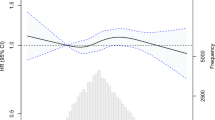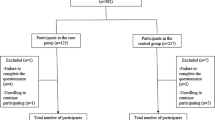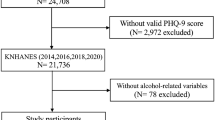Abstract
Background/Objectives
The interplay between beverage consumption patterns and critical aspects of health, such as quality of life (QoL) and sleep disorders, has been increasingly recognized. This study is essential as it explores how the Healthy Beverage Index (HBI) and Healthy Beverage Score (HBS) relate to sleep disorders and QoL in a diverse adult population, highlighting their impact on various health aspects.
Subjects/Methods
A cross-sectional analysis was conducted using data from the Shiraz University of Medical Sciences Employees Health Cohort Study (SUMS EHCS), encompassing 3380 participants aged 20–65. Data collection included a 119-item Food Frequency Questionnaire (FFQ) and comprehensive anthropometric, lifestyle, and health-related assessments. HBI and HBS were computed to evaluate beverage consumption patterns, and their associations with sleep quality and QoL were analyzed using logistic regression models.
Results
Higher HBI scores were significantly associated with 16% improved QoL (OR: 1.16, 95% CI: 1.02–1.29, p = 0.034) and a 17% reduced risk of sleep disorders (OR = 0.83, 95% CI: 0.69–0.99, p = 0.039). However, HBS did not significantly correlate with QoL or sleep quality.
Conclusion
As indicated by higher HBI scores, the findings emphasize that promoting healthier beverage choices could enhance sleep quality and overall life satisfaction.

This is a preview of subscription content, access via your institution
Access options
Subscribe to this journal
Receive 12 print issues and online access
$259.00 per year
only $21.58 per issue
Buy this article
- Purchase on SpringerLink
- Instant access to the full article PDF.
USD 39.95
Prices may be subject to local taxes which are calculated during checkout

Similar content being viewed by others
Data availability
The datasets generated during and/or analyzed during the current study are available from the corresponding author upon reasonable request.
References
Morin CM, Jarrin DC. Epidemiology of insomnia: prevalence, course, risk factors, and public health burden. Sleep Med Clin. 2022;17:173–91. https://doi.org/10.1016/j.jsmc.2022.03.003.
Weaver MD, Robbins R, Quan SF, O’Brien CS, Viyaran NC, Czeisler CA, et al. Association of sleep disorders with physician burnout. JAMA Netw Open. 2020;3:e2023256-e. https://doi.org/10.1001/jamanetworkopen.2020.23256.
Centers for Disease Control and Prevention (CDC). Impairments due to sleep deprivation are similar to impairments due to alcohol intoxication! [Internet]. 2020 [cited 2023]. Available from: CDC Module 3.
Williams GW, Shankar B, Klier EM, Chuang AZ, El Marjiya-Villarreal S, Nwokolo OO, et al. Sensorimotor and executive function slowing in anesthesiology residents after overnight shifts. J Clin Anesth. 2017;40:110–6. https://doi.org/10.1016/j.jclinane.2017.04.002.
Prather AA, Leung CW, Adler NE, Ritchie L, Laraia B, Epel ES. Short and sweet: Associations between self-reported sleep duration and sugar-sweetened beverage consumption among adults in the United States. Sleep Health. 2016;2:272–6. https://doi.org/10.1016/j.sleh.2016.09.007.
Papantoniou K, Devore EE, Massa J, Strohmaier S, Vetter C, Yang L, et al. Rotating night shift work and colorectal cancer risk in the nurses’ health studies. Int J Cancer. 2018;143:2709–17. https://doi.org/10.1002/ijc.31655.
Kudrnáčová M, Kudrnáč A. Better sleep, better life? Testing the role of sleep on quality of life. PLoS One. 2023;18:e0282085. https://doi.org/10.1371/journal.pone.0282085.
Sella E, Miola L, Toffalini E, Borella E. The relationship between sleep quality and quality of life in aging: a systematic review and meta-analysis. Health Psychol Rev. 2023;17:169–91. https://doi.org/10.1080/17437199.2021.1974309.
Lee S, Kim JH, Chung JH. The association between sleep quality and quality of life: a population-based study. Sleep Med. 2021;84:121–6. https://doi.org/10.1016/j.sleep.2021.05.022.
Parker KP, Kutner NG, Bliwise DL, Bailey JL, Rye DB. Nocturnal sleep, daytime sleepiness, and quality of life in stable patients on hemodialysis. Health Qual Life Outcomes. 2003;1:68. https://doi.org/10.1186/1477-7525-1-68.
Liu Z, Li S, Peng J. Exploring the Relationship between Sugar and Sugar Substitutes-Analysis of Income Level and Beverage Consumption Market Pattern Based on the Perspective of Healthy China. Nutrients. 2022;14. https://doi.org/10.3390/nu14214474.
Malik VS, Popkin BM, Bray GA, Després JP, Willett WC, Hu FB. Sugar-sweetened beverages and risk of metabolic syndrome and type 2 diabetes: a meta-analysis. Diabetes Care. 2010;33:2477–83. https://doi.org/10.2337/dc10-1079.
Poole R, Kennedy OJ, Roderick P, Fallowfield JA, Hayes PC, Parkes J. Coffee consumption and health: umbrella review of meta-analyses of multiple health outcomes. BMJ. 2017;359:j5024. https://doi.org/10.1136/bmj.j5024.
Yang CS, Zhang J, Zhang L, Huang J, Wang Y. Mechanisms of body weight reduction and metabolic syndrome alleviation by tea. Mol Nutr Food Res. 2016;60:160–74. https://doi.org/10.1002/mnfr.201500428.
O’Callaghan F, Muurlink O, Reid N. Effects of caffeine on sleep quality and daytime functioning. Risk Manag Health Policy. 2018;11:263–71. https://doi.org/10.2147/rmhp.S156404.
Battisti JE, John RR, Amanda S. Caffeine. In: StatPearls [Internet]. Treasure Island (FL): StatPearls Publishing; 2023. https://www.ncbi.nlm.nih.gov/books/NBK519490/.
Centers for Disease Control and Prevention (CDC). Get the Facts: Sugar-Sweetened Beverages and Consumption [Internet]. 2022 [cited 2023]. Available from: CDC - Sugar-Sweetened Beverages.
Dashti HS, Scheer FA, Jacques PF, Lamon-Fava S, Ordovás JM. Short sleep duration and dietary intake: epidemiologic evidence, mechanisms, and health implications. Adv Nutr. 2015;6:648–59. https://doi.org/10.3945/an.115.008623.
Kingshott R. The good life: Good sleepers have better quality of life and less depression. American Academy of Sleep Medicine – Association for Sleep Clinicians and Researchers. 2011. Available from: AASM.
Popkin BM, Armstrong LE, Bray GM, Caballero B, Frei B, Willett WC. A new proposed guidance system for beverage consumption in the United States. Am J Clin Nutr. 2006;83:529–42.
Duffey K, Davy B. The Healthy Beverage Index Is Associated with Reduced Cardiometabolic Risk in US Adults: A Preliminary Analysis. J Acad Nutr Diet. 2015;115. https://doi.org/10.1016/j.jand.2015.05.005.
Rasaei N, Ghaffarian-Ensaf R, Shiraseb F, Fallah M, Gholami F, Clark CCT, et al. The association between healthy beverage index and quality of life among overweight and obese women: a cross-sectional study. BMC Public Health. 2023;23:176. https://doi.org/10.1186/s12889-022-14501-1.
Jibril AT, Mirzababaei A, Shiraseb F, Barekzai AM, Jalilpiran Y, Mirzaei K. Association of healthy beverage index with circadian rhythm and quality of sleep among overweight and obese women: a cross-sectional study. Eating Weight Disord - Stud Anorex, Bulim Obes. 2022;27:2541–50. https://doi.org/10.1007/s40519-022-01391-w.
SUMS Employees Health Cohort Study (SUMS EHCS). Iran Cohort Consortium (ICC). 2023. Available from: SUMS EHCS.
Madden A, Smith S. Body composition and morphological assessment of nutritional status in adults: a review of anthropometric variables. J Hum Nutr Diet. 2016;29:7–25.
Rezazadeh A, Omidvar N, Tucker KL. Food frequency questionnaires developed and validated in Iran: a systematic review. Epidemiol Health. 2020;42:e2020015. https://doi.org/10.4178/epih.e2020015.
Ayoubi SS, Yaghoubi Z, Pahlavani N, Philippou E, MalekAhmadi M, Esmaily H, et al. Developed and validated food frequency questionnaires in Iran: A systematic literature review. J Res Med Sci. 2021;26. https://doi.org/10.4103/jrms.JRMS_1246_20.
Filmer D, Pritchett LH. Estimating wealth effects without expenditure data-or tears: an application to educational enrollments in states of India. Demography. 2001;38:115–32. https://doi.org/10.1353/dem.2001.0003.
Vasheghani-Farahani A, Tahmasbi M, Asheri H, Ashraf H, Nedjat S, Kordi R. The persian, last 7-day, long form of the international physical activity questionnaire: translation and validation study. Asian J Sports Med. 2011;2:106.
Thyagarajan A, Sahu RP. Potential contributions of antioxidants to cancer therapy: immunomodulation and radiosensitization. Integr Cancer Ther. 2018;17:210–6. https://doi.org/10.1177/1534735416681639.
Knüppel A, Shipley MJ, Llewellyn CH, Brunner EJ. Sugar intake from sweet food and beverages, common mental disorder and depression: prospective findings from the Whitehall II study. Sci Rep. 2017;7:6287. https://doi.org/10.1038/s41598-017-05649-7.
Breymeyer KL, Lampe JW, McGregor BA, Neuhouser ML. Subjective mood and energy levels of healthy weight and overweight/obese healthy adults on high-and low-glycemic load experimental diets. Appetite. 2016;107:253–9. https://doi.org/10.1016/j.appet.2016.08.008.
Mantantzis K, Schlaghecken F, Sünram-Lea SI, Maylor EA. Sugar rush or sugar crash? A meta-analysis of carbohydrate effects on mood. Neurosci Biobehav Rev. 2019;101:45–67. https://doi.org/10.1016/j.neubiorev.2019.03.016.
Crichton GE, Murphy KJ, Bryan J. Dairy intake and cognitive health in middle-aged South Australians. Asia Pac J Clin Nutr. 2010;19:161–71.
Antunes VR, Yao ST, Pickering AE, Murphy D, Paton JF. A spinal vasopressinergic mechanism mediates hyperosmolality-induced sympathoexcitation. J Physiol. 2006;576:569–83. https://doi.org/10.1113/jphysiol.2006.115766.
Lopez-Garcia E, Guallar-Castillon P, Leon-Muñoz L, Graciani A, Rodriguez-Artalejo F. Coffee consumption and health-related quality of life. Clin Nutr. 2014;33:143–9. https://doi.org/10.1016/j.clnu.2013.04.004.
Sampasa-Kanyinga H, Hamilton HA, Chaput JP. Sleep duration and consumption of sugar-sweetened beverages and energy drinks among adolescents. Nutrition. 2018;48:77–81. https://doi.org/10.1016/j.nut.2017.11.013.
Wang L, Gui J, Ding R, Yang X, Yang J, Luo H, et al. Dietary intake of flavonoids associated with sleep problems: an analysis of data from the National Health and Nutrition Examination Survey, 2007–2010. Brain Sci. 2023;13. https://doi.org/10.3390/brainsci13060873.
Asplund R. Nocturia in relation to sleep, health, and medical treatment in the elderly. BJU Int. 2005;96:15–21. https://doi.org/10.1111/j.1464-410X.2005.05653.x.
Boozari B, Saneei P, Safavi SM. Association between sleep duration and sleep quality with sugar and sugar-sweetened beverages intake among university students. Sleep Breath. 2021;25:649–56. https://doi.org/10.1007/s11325-020-02155-5.
Hedrick VE, Davy BM, Myers EA, You W, Zoellner JM. Changes in the healthy beverage index in response to an intervention targeting a reduction in sugar-sweetened beverage consumption as compared to an intervention targeting improvements in physical activity: results from the talking health trial. Nutrients. 2015;7:10168–78. https://doi.org/10.3390/nu7115488.
Qayyum S, Iltaf S, Sajjad M, Azam M. Association of sleep patterns and water intake with cognitive functions in adults in an urban environment. Pak J Med Sci. 2024;40:606–11. https://doi.org/10.12669/pjms.40.4.8268.
Acknowledgements
We extend our heartfelt gratitude to all the participants who contributed their valuable time and effort to this study. Their participation was essential to the success of our research. We also extend a special thank you to Mehran Noori for his invaluable statistical consultation and advice, which greatly enhanced the quality and rigor of our analysis.
Funding
The Vice-Chancellor of Research and Technology of Shiraz University of Medical Sciences, Shiraz, Iran, financially supported this study. The funders had no role in the design, execution, interpretation, or writing of the study.
Author information
Authors and Affiliations
Contributions
KL, SM, and SS conceived the study and designed the experiments. AA, ZG and ZR conducted the experiments and collected data. MZ, SS, and KL analyzed the data. KL and SS wrote the manuscript with contributions from ZG and ZR. All authors reviewed and approved the final manuscript.
Corresponding author
Ethics declarations
Competing interests
The authors declare no competing interests concerning this work. Any potential conflict of interest was disclosed to the European Journal of Clinical Nutrition, and measures were taken to manage them as per the guidelines.
Ethical approval
This study was approved by the Ethics Committee of Shiraz University of Medical Sciences (SUMS), with the approval number IR.SUMS.SCHEANUT.REC1402.002. All procedures performed were under the institution’s ethical standards and with the 1964 Helsinki Declaration and its later amendments or comparable ethical standards.”
Additional information
Publisher’s note Springer Nature remains neutral with regard to jurisdictional claims in published maps and institutional affiliations.
Rights and permissions
Springer Nature or its licensor (e.g. a society or other partner) holds exclusive rights to this article under a publishing agreement with the author(s) or other rightsholder(s); author self-archiving of the accepted manuscript version of this article is solely governed by the terms of such publishing agreement and applicable law.
About this article
Cite this article
Leilami, K., Sadrian, S., Ghazimoradi, Z. et al. Association between beverage quality with sleep disorders and quality of life: a cross-sectional study. Eur J Clin Nutr 79, 972–979 (2025). https://doi.org/10.1038/s41430-025-01624-y
Received:
Revised:
Accepted:
Published:
Version of record:
Issue date:
DOI: https://doi.org/10.1038/s41430-025-01624-y



